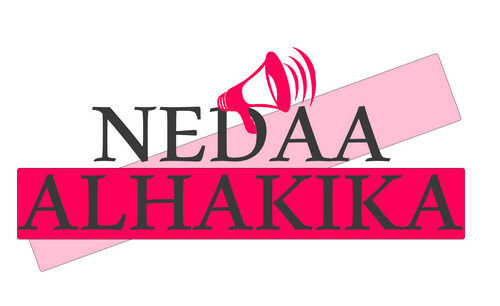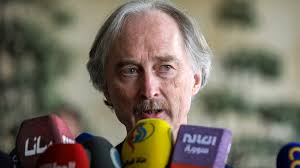Obviously today it’s really a watershed moment in the history of Syria. It’s a nation that has endured 14 years nearly of relentless suffering and unspeakable loss. And let me once again extend my deepest solidarity to all who have borne the weight of death, destruction, detention, and untold human rights violations. This dark chapter has left deep scars, but today we look forward with cautious hope to the opening of a new time—one of peace, reconciliation, dignity, and inclusion for all Syrians.
To those displaced, this moment renews the vision of returning to homes once lost. To families separated by war, the beginning of reunions bring hope. To those unjustly detained, and the families of the detained and the missing, the opening of the prisons reminds us of justice’s eventual reach.
But the challenges ahead remain immense and we hear those who are anxious and apprehensive. Yet this is the moment to embrace the possibility for renewal in Syria. The resilience of the Syrian people offers a path forward to a united and peaceful Syria.
But to this end, let me emphasize the clear desire expressed by millions of Syrians that stable and inclusive transitional arrangements are put in place urgently, and that the Syrian institutions continue to function, and that the Syrian people are enabled to begin to chart the path to meeting the legitimate aspirations of the Syrian people and restore a unified Syria, with its sovereignty, independence and territorial integrity, in a way that can receive the support and engagement of the entire international community.
I have heard in the last few days and in the last few hours a message from many Syrians, including armed groups and civil society, both women and men, and have noted public statements underlining a will to protect their fellow Syrians and state institutions going forward against retribution and harm.
And this is important, let me also echo these statements and issue a clear and unambiguous appeal at this hour that all armed actors on the ground maintain good conduct, law and order, protect civilians and preserve public institutions.
Let me urge all Syrians to prioritize dialogue, unity, and respect for international humanitarian law, and human rights as they seek to rebuild their society. Let me stress that there must be a collective effort to secure peace and dignity for all. And that I stand ready to support the Syrian people in their journey towards a stable and inclusive future decided and shaped by the Syrian people themselves.
Today let’s honor the memory of those who have suffered for decades by committing to help Syrians build a Syria where justice, freedom, and prosperity are shared realities. Let us stand in solidarity with Syrians to help them ensure that this new chapter is one of hope and opportunity for every Syrian.
Let me now take a few questions.
What steps is the United Nations prepared to take to support a post-Assad Syria, and achieving democratic governance ensuring accountability for war crimes and rebuilding the country while preventing further regional instability?
As you heard in my statement, it’s extremely important that all Syrians now come together and lay the foundations for a future Syria that can meet the aspirations that they have been fighting for for the last 14 years. We need to start today with establishing as I said transitional arrangements, that’s the first priority. And then we need to build on that to secure peace, to prevent that Syria is divided, and then we will continue the discussions on all the items that you mentioned here today. But today, first things first.
Where is President Assad now, where is his family, what health condition are they in? And also do you think he should be tried for war crimes?
Mr. Pedersen: Good question. I think we’re all asking the same questions today, and frankly I have no more information than you have.
(Questions inaudible) for the war crimes?
Mr. Pedersen: Listen, we all know that the long arms of justice will continue to work, and how is this going to develop, I have no, there is no easy answer to this. As I rightly said I have no idea where he is. So, these are questions that will have to be answered in full detail later down the road.
We heard from Turkish Foreign Minister Fidan there pretty clear both a call for a peaceful transition in Syria, but also a pretty clear condemnation of the SDF. It’s been very clear to us at the Forum over the past two days that there is real disagreement between the major powers that have sway in Syria. How do you now as you move forward with this transition ensure that countries like Iran, Türkiye, Russia, can play constructive roles in this?
Mr. Pedersen: Listen, I think it’s not only about Iran, and Türkiye, and Russia, it is also obviously about the Arab states, it’s about Jordan, it’s about Lebanon, and of course also a broader group of Arab States. And I had the pleasure yesterday evening meeting with the foreign ministers from obviously Qatar, as the host, from Egypt, Saudi Arabia, Iraq, and Jordan – did I forget someone – and then the Russians, and the Turks, and the Iranians. In that meeting, my message to all of them was – this is the time for making sure that we have inclusive transitional arrangements that include all communities in Syria.
This is of course first and foremost the responsibility of the Syrians, but it will require as I said yesterday, the help of all of you around the table. I’m pleased to say that at least as of yesterday this was the common message coming out from that group, and the strong support for the work, the hard work ahead of us and the support to the role of the United Nations in this respect.
You called for a meeting I think in Geneva next week, who will be invited? When it comes to the opposition, the HTS is one of the key players now on the ground in Syria, while its leader is on terrorist list. How will you deal with that, and I know recently even delivering aid to Idlib was a problem because as the HTS was on the ground and they are on the terrorist list and now they are a key player in Syria, how will you deal with it?
Mr. Pedersen: Let’s be honest, the situation on the ground has changed dramatically. Obviously, the fact that HTS is a listed group creates challenges. It’s extremely important that we now see on the ground a development that proves that we can achieve, you know, a transition to what I hope will be a democratic future for Syria.
And here we are following of course extremely closely what is happening on the ground with all armed factions, and then there are certain procedures in place that will have to be followed – if they are to be delisted. That is a process that I’m not in control of, but obviously we will continue to work to try, as I said, to make sure that we have as an inclusive process as possible, but let me be honest this is work in progress. Because as I said yesterday, the realities on the ground are changing all the time, and of course as we are speaking we are seeing some developments in Damascus that I hope we can see an end to, and I hope that we will not see continued clashes, but, and this will be our appeal, as I have said in my statement, to all groups, and then we are working to see how we can move this process forward.
We are seeing that the armed groups in Damascus they are willing to cooperate with the Syrian government, so do you think that the Syrian government or any member of the regime should take part in the transition?
Mr. Pedersen: Let me be honest with you, what we are seeing coming out of Damascus are what I would call contradictory messages at this time, but what I think is important to stress is that we avoid bloodshed, that there is a dialogue, that there is an inclusive process and a preparation for transitional arrangements. This is now my key message to all – avoid bloodshed, make sure that it is inclusive, that all communities in Syria are included, and that the nervousness that some are facing, are fearing, that we can address this, and move forward to peace and stability. And as I said, it could be the beginning really for a new Syria. Let’s hope that there is a willingness to work together to that, and as I said we will do whatever we can to help. Thank you so much, great to see you.
Doha, 8 December 2024

